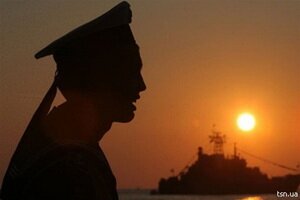
Part 11 "And at the Heart of All Ideas of Getting United Is Scam Stealing"
Part 10 "How Was Being Introduced a Control of the Uncontrollable Situation"
Part 9 "August, 1994"
Part 8. "Split"
Part 7. "Separatists Begin and …Lose"
Part 6. "At the Peak of the Fleet-Wide Psychosis"
Part 5 “It Nearly Came to War”
Part 4. “Sevastopol - Crimea – Russia”
Part 3. “How the Black Sea Fleet Was Divided “Fraternally”
Part 2. “Black Sea Fleet on the Scales of Political Tender“
Part 1. “The Russian Federation’s Black Sea Fleet and National Security of Ukraine”
"...At this, like before, the "first violin" was played here by Yu.Meshkov, who categorically refused to implement the decisions of the Ukrainian Supreme Council on liquidation "of the presidency" in the Crimea, on the grounds that he was "elected by a majority of the population of the Peninsula." Moreover, the former "President" of the Crimea allowed himself to express direct threats to Ukraine, talking about “unpredictable development" of both, the Crimean and Russian-Ukrainian relations. In this context a particularly negative reaction of Yu.Meshkov was caused by the decision of the General Prosecutor's Office of Ukraine to initiate a criminal investigation against him.".
Thus ended the previous 11 part of the material "Crimea 94"
Part 12 "End - all"
The Commandment of the Black Sea Fleet had its own position as to the Crimean issue. Thus, the Vice-Speaker of the Crimean Parliament - Deputy Commander of the Black Sea Fleet O.Frolov said that the Black Sea Fleet had no intention to participate in the confrontation between the Crimea and Ukraine. At the same time, on the 20th of March, 1995, due to the events in the ARC, the Black Sea Fleet Military Council decided to bring the Fleet’s combat readiness to a higher level, as well as to strengthen the protection of its Crimean facilities. Also got activated transferring to Sevastopol of the 98th Regiment of Coastal Defence and of the 1096 th Anti-Aircraft Missile Regiment from the 126th Division of Coastal Defence of the Black Sea Fleet.
***
 |
| International community was closely observing the situation in the Crimea and was , in general, supporting Ukraine |
International community was closely observing the situation in the Crimea, and, in general, was supporting Ukraine. In particular, touching on the subject of its territorial integrity, the British radio station BBC drew attention to a single, unambiguous from the very first day of independence, position of all branches of the Ukrainian authorities in one of the most important issues.
The U.S. newspaper "Washington Post" noted a carefully planned and well-organized nature of the blow inflicted by Ukraine on the Crimean separatism. At the same time it expressed confidence that Russia was not able to interfere directly into the Crimean-Ukrainian relations because of its problems in Chechnya.
Parallels between the Crimea and Chechnya were also drawn by the radio station "Deutsche Welle", which pointed out the effectiveness of Ukraine’s policy, solving the problem of the Crimean separatism without using an armed force, unlike Russia, which was leading war in the Northern Caucasus.
In this connection, attention was drawn to the lack of large-scale support of the separatists by the population of the Peninsula.
At the same time, media of Russia kept escalating the situation. Thus, the Russian news agency ITAR-TASS, as well as a number of other media, informed about the "blocking the building of the Supreme Council of the Crimea by Special Forces of Ukraine." It was also reported that Yu.Meshkov had asked Russian Cossack troops for help.
***
Within the framework of its earlier decisions, on the 21st of March The Supreme Council asked the Parliament of the Crimea, by the 15th of May, 1995, to develop and submit for approval by the Supreme Council of Ukraine the draft of a new Constitution of the Autonomous Republic of the Crimea. At this, according to Ukrainian Law, the Prosecutor of the ARC was given the right to protest the legal acts of the Government and other legislative authorities of the Crimea, which were contradicting the Constitution and laws of Ukraine.
On the 22nd of March, an Extraordinary Session of the Parliament of the Crimea approved the list of the Plenipotentiary delegation of the Supreme Council of the Crimea in the negotiations with Ukraine. The Responsibilities of the delegation included studying and analysis of the current political and legal situation in Ukrainian-Crimean relationships, as well as search for a compromise on this issue.
|
A. Drobotov, Prime Minister of the Crimea, from the 22nd to the 31st of March, 1995 (appointed by the Supreme Council of the Crimea, but not yet in the position; on the 31st of March, 1995 the Government of the Crimea was re-subordinated to the Cabinet of Ministers of Ukraine and Anatoly Franchuk was returned to the post of the Prime Minister of the Crimea) http://genshtab.info/; http://ru.wikipedia.org |
Besides, the Crimean Parliament dismissed the Prime Minister of the Crimea A.Franchuk, as well as the Deputy Prime Minister A.Senchenko who held moderately loyal position towards Ukraine. The new Head of the Crimean Government was appointed the Minister of Agriculture and Food of the Crimea A.Drobotov.
Using the live broadcast of the meeting of the Crimean Parliament, Deputy of the Supreme Council of the Crimea O. Kruglov urged residents of the Peninsula to gather signatures for a petition of no confidence in the President of Ukraine Leonid Kuchma, and on the 24th of March get to a meeting of "patriotic forces of Sevastopol" and officers of the Black Sea Fleet.
On the 22nd of March were published Yu.Meshkov’s appeals to the population of the Crimea, Russian leadership and international community, including the UN Secretary- General and the OSCE Secretary- General. In all these appeals the Supreme Council of Ukraine was accused of "violating the principles of international Law", "unilateral decision-making on the Crimea," and of "trying to turn the Autonomous Republic of the Crimea into a region of Ukraine in the rank and file." At this, demands were made "to provide confining pressure on Ukraine." In particular, Yu.Meshkov urged the Russian leadership to sign a basic political agreement with Ukraine only if Kiev agrees with the validity of the Constitution of the ARC.
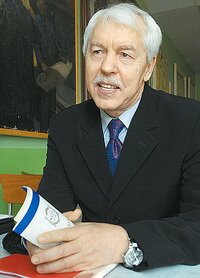 |
| On the 22nd of March were published more of Yu. Meshkov’s appeals to the people of the Crimea, the Russian leadership and the international community |
On the 22nd of March the situation in the Crimea was considered at a meeting of the State Duma of Russia. A report on this issue was made by the Head of the Committee for CIS and Affairs of Compatriots K. Zatulin. In his report, he accused Ukraine of "planting Ukrainian structures in the Crimea" and "insulting the will of the people of the Crimea." In connection with this, K. Zatulin recommended the State Duma not to ratify the basic political Agreement between Russia and Ukraine, and to make the very decision of the Crimean issue the main condition for the issue of confirmation of the territorial integrity of the Ukrainian state.
Based on the discussion of the mentioned above issue, the State Duma of Russia approved the list of members of the "Commission on the Black Sea Fleet", adopted a Statement "On the attitude to the Decisions of the Supreme Council of Ukraine on the Crimea" and the Resolution
"On the Statement of the State Duma" On the Attitude to the Decisions of the Supreme Council of Ukraine on the Crimea."
In these documents, taking into consideration "the President and the Supreme Council of the ARC’s Appeal to the Leadership of the Russian Federation", was expressed "serious concern about the future of Russian-Ukrainian relations in connection with the decisions of the Supreme Council of Ukraine, which do not take into account the will of the population of the Republic of the Crimea, interrupt the legal process between the Crimea and Ukraine, and also can destabilize the situation in the region. "
At this, against the background of political and diplomatic "reverences", the Russian side was openly pressing on Ukraine, using the most sensitive issues in bilateral relations. Thus, in the Statement of the State Duma of the Russian Federation was mentioned the "hasty decision of the Supreme Council of Ukraine," which, according to Russian Parliamentarians, "was taken without considering the full range of possible political and legal consequences and impact on the general fond of Russian-Ukrainian relations," that "influenced the discussion in the State Duma of the problems of the Russian-Ukrainian negotiations, including the questions of restructuring of Ukraine's debts, division of the Black Sea Fleet and the status of the latter’s main base - the city of Sevastopol. "
Formally supporting the territorial integrity of Ukraine, the State Duma of the Russian Federation recommended the Government of the Russian Federation in the negotiations with the Ukrainian side to take into consideration the position of "legitimate representatives of the Crimea itself."
Based on the above, the State Duma of Russia, in particular, decided:
- to propose to the Government of the Russian Federation to submit to the State Duma the whole package of signed in February-March agreements with Ukraine;
- to invite to the meeting of the State Duma of March 24, 1995 the Head of the State Delegation of the Russian Federation on the negotiations with Ukraine O.Soskovets for familiarization with information on the progress of negotiations and replying to questions from Deputies;
- to instruct the Committee on CIS Affairs and Relations with Compatriots, the Committee on Legislation and Judicial Reform together with the Committee on Budget, Taxes, Banks and Finance to prepare and submit to the State Duma a draft law "On the procedure of Restructuring of Debts of Foreign States to the Russian Federation";
- to instruct the Duma’s part of the Inter-Parliamentary Commission on the Russian-Ukrainian cooperation, and the State Duma’s Commission on the Black Sea Fleet in the negotiations and consultations to proceed from the fact of recognition of Sevastopol in the administrative- territorial boundaries of the urban districts as of December 1991 the main base of the Black Sea Fleet;
- to propose to the President of the Russian Federation to hold consultations with the Government and Federal Assembly of the Russian Federation on issues of relations with Ukraine.
***
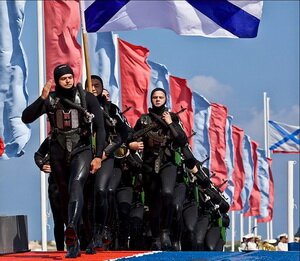 |
|
Russian political demarche as always was accompanied by demonstration of military force http://bibo.kz/ |
Russian political demarche as always was accompanied by demonstration of military force. For example, in the mentioned above Statement of the State Duma of the Russian Federation dated 22 March, 1995 as a separate item was expressed "belief that the personnel of the Black Sea Fleet will do all it can to prevent destabilization, provocations, threat to life and safety of Russian and other citizens in the Crimea."
On the same day, despite the previous statements made by the Military Council of the Black Sea Fleet about non-interference in political problems of the Crimea, the Coordinating Council of the BSF officers’ meetings issued a public statement condemning the actions of Ukraine in the Crimea. At this, were supported positions of Yu.Meshkov, the Supreme Council of the Crimea and Sevastopol City Council on the issue.
***
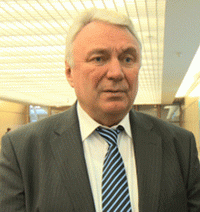
|
|
O. Soskovets, People's Deputy of the USSR in 1989-1991, since December 1993 - First Deputy Prime Minister of Russia, on the 20th of June, 1996 by President Boris Yeltsin’s Decree was dismissed from the post of First Deputy Prime Minister because of the scandal associated with taking out from the Government House a box from paper for a copier with half a million dollars in cash in it. Since 2011, the President of the Russian Union of Manufacturers http://ru.wikipedia.org/ |
But the situation in the Crimea was not developing according to the Russian scenario. Despite attempts to demonstrate a firm position against Kiev, the Supreme Council of the Crimea did make concessions to Ukraine.
In particular, on the 23d of March, 1995 the Crimean Parliament decided to postpone the elections for local Councils from April 29 to May 14, as determined by the relevant provisions of the legislation of Ukraine. There was also raised a question about the dismiss from the Supreme Council of the ARC of nine Deputies from Sevastopol, as by the decision of the Supreme Council of Ukraine, it was not any longer subordinate to the ARC.
Besides, there had not been formed a delegation of the Parliament of the Crimea to the State Duma of the Russian Federation. The excuse was "absence of an appropriate application from the Russian side."
Kept getting sharper problems connected with the Crimean Government. Thus, the Ministry of Justice of Ukraine protested the Decision of the Supreme Council of the ARC from the 22nd of March, 1995 on dismissal of the Prime Minister of the Government of the Crimea A.Franchuk, recognizing that action a gross violation of the adopted by the Supreme Council of Ukraine legislation acts regarding the ARC. Against this background, was getting deeper the split in the leadership of the Russian Federation, where there was no clear position on the Crimean issue. In particular, the Head of Russia's state delegation to the talks with Ukraine O.Soskovets refused to speak to the State Duma of Russia on the issue of Russian-Ukrainian relations. According to him, the events in the Crimea were an internal affair of Ukraine that obliged the Russian Government to adhere to a balanced position on the issue. According to O.Soskovets, such a position would allow Ukraine to solve its problems without any pressure from the Russian Federation.
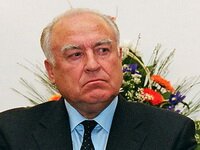 |
|
V. Chernomyrdin (1938-2010), the Head of the Government of the Russian Federation in 1993-1998, Ambassador Extraordinary and Plenipotentiary of the Russian Federation in Ukraine in 2001- 2009, from 2009 -Advisor to the President of the Russian Federation. http://photo.peoples.ru/; http://ru.wikipedia.org/ |
The Prime Minister of the Russian Government Viktor Chernomyrdin also declined the offer to speak in the State Duma of the Russian Federation. According to him, more important for him was participation in the Government’s meeting chaired by the President of the Russian Federation Boris Yeltsin.
A different position was held by the Speaker of the State Duma of the Russian Federation I.Rybkin, who called the Crimea a "sphere of strategic interests and exclusive influence of Russia." In an interview to the newspaper "RussianNews", he called for a referendum on the status of the Crimea as "the only opportunity to solve the Crimean problem." According to I.Rybkin, "thereby the Crimean could decide themselves: to live in an autonomous region, or in a state, which will simultaneously be part of both Russia and Ukraine."
***
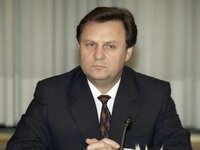 |
|
I. Rybkin, the Speaker of the State Duma of the Russian Federation in 1994-1996. In 2004 he was nominated as a candidate for the post of the President of the Russian Federation, was supported by B. Berezovsky. On the 5th of February, 2004 Ivan Rybkin disappeared, on February 10 evening I. Rybkin was found in Ukraine. Later I.Rybkin announced that he went to Kiev voluntarily "in order to meet privately with those whom I wanted to meet with", "I just had there secret negotiations concerning safety of Russia" ... http://www.mk.ru/politics/; http://ru.wikipedia.org |
n the 24th of March, 1995 Yu.Meshkov made yet another call for Russia to “use all its authority to normalize relations of the Crimea with Ukraine.” At the same time, he called on the President and the Minister of Defense of the Russian Federation to leave subunits of the Black Sea Fleet in the ARC.
As it might be expected, Moscow approved these calls of the "President" of the Crimea. So, in response to Yu.Meshkov’s appeal, Chief Commander of the Russian Navy Admiral F.Gromov confirmed Russia's position on the need to preserve Sevastopol as the main base of the Black Sea Fleet. At the same time, he said, the Black Sea Fleet would remain in high combat readiness until the final settlement of this issue.
Trying to prevent attempts to destabilize the situation in the Crimea, Ukraine's leadership was trying to strengthen the force of Law in the Peninsula. On the 24th of March, 1995 the Cabinet of Ministers of Ukraine stopped financing bodies of the executive power of the Autonomous Republic of the Crimea. In Simferopol arrived some 200 servicemen of Special Forces of MIA of Ukraine . Despite attempts of pro-Russian forces to accuse Ukraine of "force liquidation of statehood of the ARC", Ukrainian Special Forces and other Police subunits did not cause a negative reaction of the Crimean population.
Apart from this, was prevented an illegal attempt of the Parliament of the Crimea to change the leadership of the Government of the Crimean Autonomy. Thus, the Ukrainian Ministry of Internal Affairs officials did not let into the office of the Prime Minister of the Crimea the new "Head of the Crimean Government" A.Drobotov and the accompanying him Speaker of the Crimean Parliament S.Tsekov. In the absence of a legitimate Head of the Government of the ARC A.Franchuk, the room was guarded by Ukrainian Militia (Police).
***
Continuing efforts of Ukraine to resolve the situation in the Crimea were supported by leading countries of the world and international organizations. Thus, the Ambassador of France in Ukraine D.Shassar recognized as internal affairs of Ukraine decisions of the Supreme Council to cancel the Constitution of the Crimea and to liquidate the institute of Presidency in the ARC. Kiev’s position on the Crimean issue found understanding of leaderships of Greece and Bulgaria.
***
Quite the opposite position was that of the State Duma of Russia. On the 26th of March, 1995 in Simferopol arrived a delegation of the State Duma Commission on issues of the Black Sea Fleet, led by K. Zatulin. At the airport, apart from the Commandment of the Black Sea Fleet , the Commission was met by the Prosecutor of the Crimea V.Kuptsov and Chief of the Main Department of the Ministry of Internal Affairs of Ukraine in the ARC V.Kirichenko. Representatives of the Ukrainian Law Enforcement agencies had warned K. Zatulin about inadmissibility of public statements and actions aimed at undermining of the national sovereignty and territorial integrity of Ukraine.
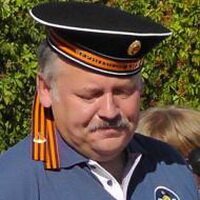 |
|
On the 27th of March K. Zatulin spoke at a meeting of pro-Russian forces near the Black Sea Fleet Headquarters in Sevastopol and supported the idea of a referendum on the status of the Crimea http://new-sebastopol.com/ |
Despite this, on the 27th of March, K. Zatulin spoke at a meeting of pro-Russian forces near the Black Sea Fleet Headquarters in Sevastopol and supported the idea of a referendum on the status of the Crimea. He also announced about intentions of the Russian leadership to put pressure on Ukraine on the Crimean issue, by updating the problem of “Ukrainian debts to Russia” included. According to him, the State Duma of Russia would not ratify any agreement with Ukraine if the latter did not cancel its decisions on the Crimea.
Similar ideas were expressed by K. Zatulin at the meeting with the Commander of the Black Sea Fleet E.Baltin, the "President" of the Crimea Yu.Meshkov, Speaker of the ARC Parliament S.Tsekov, representatives of pro-Russian forces of the Peninsula.
***
The bacchanalia in the Peninsula irritated sane population of the ARC. Thus, the Public Council of the Crimea (opposition Parliament, created in the spring of 1993 in order to counteract the anti-Ukrainian position of the Supreme Council of the Crimea), the organization of "Prosvita", Union of Officers of Ukraine, the Crimean branch of the Organization of Ukrainian Nationalists (OUN), the Ukrainian Republican Party, Public Congress of Sevastopol and other organizations, expressed a strong protest against the Crimean leadership’s attempts to create a situation of chaos in the Peninsula and to separate it from Ukraine.
But pro-Ukrainian organizations of the Crimea demanded to cancel the Constitution of the ARC, as well as a number of Laws of the Autonomy, contradicting the Law of Ukraine. Besides, the Supreme Council of the Crimea was blamed for the actual collapse of the Crimean economy, disrupting planting and programs of water supply of the Peninsula.
At the same time was expressed concern with the destructive position of the Russian Federation openly interfering into Crimean life and provoking a conflict.
In particular, attention was drawn to provocative visits to the Crimea of representatives of the state leadership of the Russian Federation, illegal actions in the Crimea of the Consular Group of the Russian Embassy in Ukraine, giving Russian citizenship to residents of the ARC bypassing the Law of Ukraine.
***
Despite all the efforts of Russia to provoke a conflict in the Crimea, solid, balanced and consistent position of Ukraine allowed to avoid turning the Crimean Peninsula into another area of conflict at the territory of the former Soviet Union. The point in the process of the Crimea‘s slipping into the abyss of the armed confrontation was put by the meeting on the 30th of March, 1995 of the President of Ukraine Leonid Kuchma with a Parliamentary delegation, members of the Government, as well as the leadership of the city and local Councils of the ARC.
During the meeting, representatives of the Crimean Government supported all decisions of the leadership of Ukraine. It was decided to allocate about 500 million US dollars from the budget of Ukraine to supply the Crimea with water, carry out spring field works, open the resort season, and return deported peoples.
Epilogue
On the 31st of March, 1995 a visiting Consular Group of the Russian Embassy in Ukraine, engaged in registration of Russian citizenship to residents of the Crimea and Sevastopol, began preparations for departure. As explained the head of the Group A.Molochkov, Russia was forced to fulfill the demand of Ukraine, although it supposedly contradicted the Vienna Convention on Consular Relations and the Law of Ukraine on citizenship.
Public opinion poll showed that more than half of the inhabitants of the Crimean Peninsula approved of the decision of Ukraine to liquidate the institute of Presidency in the Crimea.
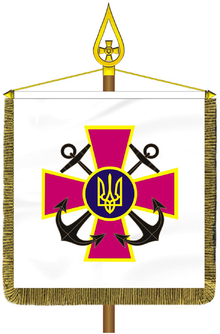 |
|
The flag of the Ukrainian Navy Commander |
On the 1st of April, in Ismail finished its work the Commission of the Ukrainian Navy on transmit-receive of river ships, boats, weapons and coastal infrastructure of the former Brigade of River Ships and Boats of the Black Sea Fleet. The Certificate of the transmit-receive was signed by the Chief of the Headquarters of the North-West sea area Captain of the 1st Rank D.Ukrainets (from Ukraine), and the First Deputy Chief of the Black Sea Headquarters of the Black Sea Fleet, Rear Admiral A.Manchenko. From the mentioned above funds in Izmail began formation of what is now Ukrainian Navy.

